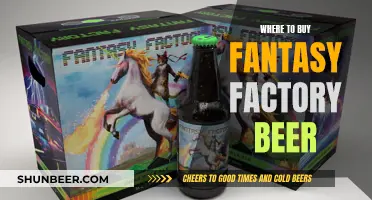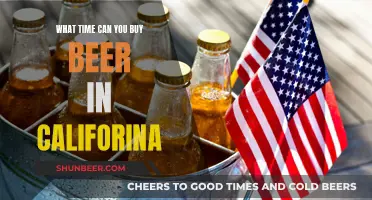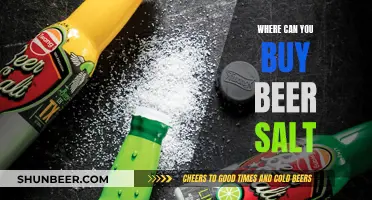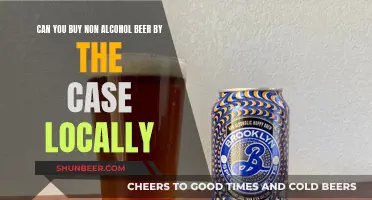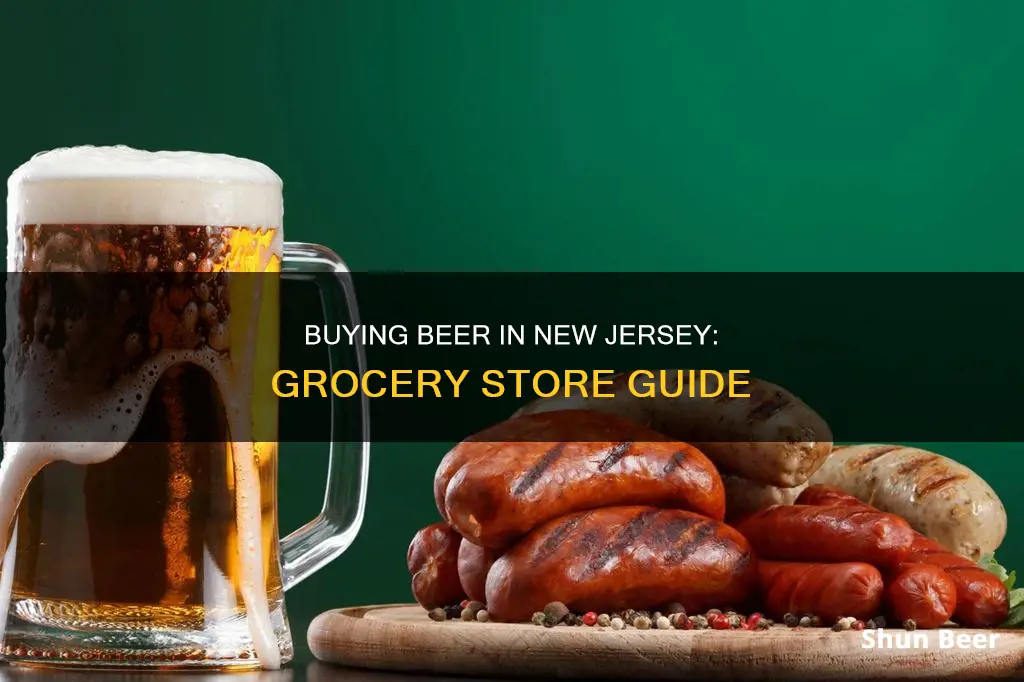
New Jersey's alcohol laws are among the most complex in the United States, with many peculiarities not found in other states' laws. While there is no ban on selling alcoholic beverages at grocery stores, New Jersey limits each chain to two licenses, so with only a few exceptions, most supermarkets, convenience stores, and gas stations do not sell alcoholic beverages.
The state's alcohol market is influenced by nearby cities like New York and Philadelphia, embracing new trends while preserving traditional practices that protect independent bars, restaurants, and liquor stores from large chains. New Jersey's dense population also makes it a lucrative market for alcohol companies, ranking sixth in the US for spirit consumption and second in the Northeast.
The state's history with alcohol dates back to its early colonial period, with colonial winemakers receiving recognition from the Royal Society of Arts for producing high-quality wine. Despite the impact of Prohibition and the temperance movement, which led to the closure or relocation of many alcohol businesses, New Jersey has since loosened restrictions and worked towards repealing Prohibition-era laws.
Today, New Jersey's alcohol industry continues to navigate complex regulations while serving a market with a strong demand for alcoholic beverages.
| Characteristics | Values |
|---|---|
| Can you buy beer at grocery stores in NJ? | Yes, but there are restrictions. |
| Restrictions | Corporations are limited to two retail distribution licenses, making it impractical for chain stores to sell alcoholic drinks. |
| Exceptions | Some grocery stores have a separate attached sister store that sells alcohol. |
What You'll Learn
- New Jersey's alcohol laws are among the most complex in the U.S
- State law prohibits corporations from possessing more than two retail distribution licenses
- New Jersey's alcohol market is influenced by nearby cities like New York and Philadelphia
- The state ranks sixth for the most spirit consumption in the U.S
- Some grocery stores in New Jersey have separate liquor stores attached to them

New Jersey's alcohol laws are among the most complex in the U.S
New Jersey's alcohol laws are overseen by the Division of Alcoholic Beverage Control (ABC), which is managed by the state's Attorney General. The state has 29 distinct liquor licenses granted to manufacturers, wholesalers, and retailers, with the number of retail licenses determined by a municipality's population. The state's laws grant individual municipalities substantial discretion in passing ordinances regulating alcohol sales and consumption, resulting in variations from town to town.
One notable aspect of New Jersey's alcohol laws is the restriction on corporations to only two retail distribution licenses, making it challenging for chain stores to sell alcoholic beverages. This restriction, along with municipal ordinances, significantly limits supermarkets and convenience stores from selling beer, a practice that is common in many other states.
The state's history with alcohol dates back to its early colonial period, with colonial winemakers receiving recognition for producing high-quality wine. During the 19th and early 20th centuries, the industry flourished with the influx of European immigrants, particularly Germans and Italians, who brought their winemaking, brewing, and distilling techniques. However, the temperance movement and Prohibition (1919-1933) dealt a significant blow to the industry, with many businesses closing or relocating.
In recent years, New Jersey has taken steps to update its liquor laws, with Governor Phil Murphy signing legislation to bring nearly 1,500 liquor licenses into the marketplace and ease restrictions on breweries and distilleries. These changes aim to boost the state's economy and support small business owners.
Despite these updates, New Jersey's alcohol laws remain complex, with various regulations governing the sale, distribution, and consumption of alcoholic beverages. The state's dense population and high consumption of spirits make it a lucrative market for alcohol companies, but the intricate web of laws presents unique challenges for businesses looking to establish themselves in the Garden State.
Buying Beer in Washington: Understanding the 2 AM Rule
You may want to see also

State law prohibits corporations from possessing more than two retail distribution licenses
In the state of New Jersey, state law prohibits corporations from possessing more than two retail distribution licenses. This means that a chain can only sell alcohol at two locations in the state. However, some stores have found a loophole by having a separate entrance to go through for alcohol and operating under a separate entity.
Buying Beer After Time Falls Back: What's the Rule?
You may want to see also

New Jersey's alcohol market is influenced by nearby cities like New York and Philadelphia
New Jersey's alcohol market is a blend of influences from large nearby cities like New York and Philadelphia. The state is known for embracing new trends while preserving traditional practices that have been in place for decades. For instance, it has protected independent bars, restaurants, and liquor stores from being overshadowed by large chains. Despite its small size, New Jersey's dense population makes it a lucrative market for alcohol companies.
New Jersey is one of the ten largest beverage alcohol markets in the United States. In 2022, the state sold 65.8 million cases of beer, 15.7 million cases of wine, and 10.3 million cases of spirits. It ranks sixth on the list of states that consume the most spirits and is the second-largest market in the Northeast United States. With approximately 9.2 million people in 2022, 6.9 million were within the legal drinking age bracket.
New York, on the other hand, is a global trendsetter in the drinks sector, with many alcohol manufacturers, suppliers, and distributors seeking a solid presence in the state. In 2022, New York had a population of 19.7 million, with 14.8 million within the legal drinking age range. The state ranks fourth in alcohol consumption, behind California, Texas, and Florida.
Philadelphia, a city in Pennsylvania, also influences New Jersey's alcohol market. The city's dynamic liquor market is led by brands such as Tito's Vodka, Aperol, Bulleit, and Bacardi, each representing a different category. Philadelphia's drinkers showcase a mix of traditional and modern tastes, with tequila, bourbon, and vodka being the top three liquor categories.
In terms of purchasing alcohol in grocery stores in New Jersey, the laws can vary between cities. However, there are some statewide laws in place. For example, liquor cannot be purchased in grocery stores, supermarkets, convenience stores, or gas stations, and a business can only obtain three licenses. However, some grocery stores may have a separate liquor store attached or operate under a separate entity to get around this law. Additionally, New Jersey allows direct-to-consumer shipping of alcohol, and people over 21 can order alcohol through licensed retailers.
BJ's Beer Buying Guide: Can I Purchase?
You may want to see also

The state ranks sixth for the most spirit consumption in the U.S
New Jersey has some interesting laws regarding the sale of alcohol. While it is possible to buy beer at grocery stores in the state, it is not a straightforward process. Chains are permitted to sell alcohol in two locations in the state, and some stores have different owners, allowing them to exploit loopholes. For example, some grocery stores have a separate entrance for alcohol, or operate under a separate entity, or have a liquor store attached to the supermarket. In some cases, alcohol and groceries must be paid for separately.
New Jersey ranks sixth for the most spirit consumption in the U.S. The state had an approximate population of 9.2 million people in 2022, with 6.9 million of them within the legal drinking age bracket. In 2022, there were 65.8 million cases of beer sold, followed by 15.7 million cases of wine, and 10.3 million cases of spirits. New Jersey is one of the ten largest beverage alcohol markets in the United States. The state's dense population makes it a lucrative market for alcohol companies.
The laws regarding alcohol sales in New Jersey are designed to protect independent bars, restaurants, and liquor stores from being overwhelmed by large chains. The state is overseen by the Division of Alcoholic Beverage Control (ABC), which is responsible for licensing, tax collection, auditing, fee collection, and enforcing the state's laws and regulations. All businesses dealing with alcohol in the state must be licensed.
The sale and distribution of alcoholic beverages in New Jersey are handled by private entities but are still regulated by state legislators. New Jersey is a Franchise State, which means certain laws protect alcohol beverage distributors and prevent their suppliers from terminating distribution contracts without good cause.
The off-premise sale of liquor, wine, and beer is generally allowed from 9 am to 10 pm, while the on-premise sale of alcohol is permitted from 9 am to 2 am. New Jersey also supports the alcohol-to-go policy, allowing restaurants, bars, and liquor stores to sell alcohol for takeaway, as long as it is delivered by a licensed third-party service.
Buying Beer: When Can You Legally Purchase It?
You may want to see also

Some grocery stores in New Jersey have separate liquor stores attached to them
Alcohol laws in New Jersey are complex and contain many peculiarities not found in other states' laws. While there is no ban on selling alcoholic beverages at grocery stores, New Jersey limits each chain to two licenses. This means that, with only a few exceptions, most supermarkets, convenience stores, gas stations, and pharmacies do not sell alcoholic beverages.
In addition, liquor sales are only permitted in a separate department or attached sister store. Bars are allowed to sell packaged goods. With the exception of Jersey City and Newark, all municipalities must allow off-sales of beer and wine at any time on-sales are permitted. However, since alcoholic beverages are generally only found in package stores, this right is rarely exercised.
New Jersey's alcohol laws are designed to protect independent bars, restaurants, and liquor stores from being overwhelmed by large chains. The state also has a strong tradition of municipal home rule, which gives local municipalities considerable authority in the licensing and regulating of alcohol-related businesses.
Arizona Beer Laws: When Can You Buy?
You may want to see also
Frequently asked questions
Yes, but it depends on the store and its location. New Jersey law limits each grocery store chain to two licenses, so with only a few exceptions, most supermarkets/convenience stores/gas stations/pharmacies do not sell alcoholic beverages.
New Jersey's alcohol market is a blend of influences from large nearby cities like New York and Philadelphia. The state embraces new trends while preserving traditional practices that have been in place for decades, including protecting independent bars, restaurants, and liquor stores from being overwhelmed by large chains.
You can buy beer at liquor stores, bars, and some grocery stores.



